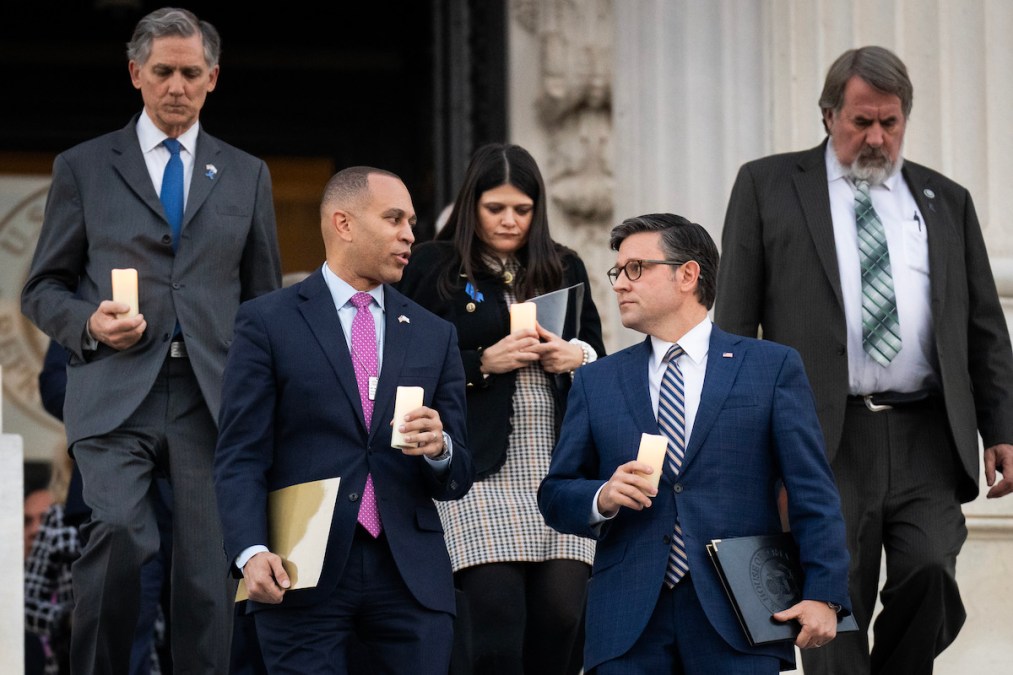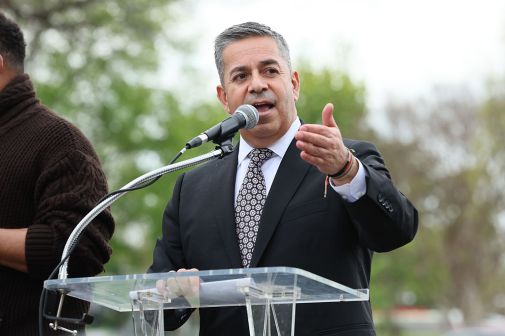House leaders announce new, bipartisan AI task force

House Speaker Mike Johnson, R-La., and Minority Leader Hakeem Jeffries, D-N.Y., are launching a new bipartisan task force on artificial intelligence, unveiling the 24 members who will serve on the group in a Tuesday announcement.
Reps. Jay Obernolte, R-Calif., and Ted Lieu, D-Calif., will lead the task force in exploring how Congress can continue leading the world in AI innovation, while simultaneously considering how to employ appropriate guardrails to protect the nation against threats, according to a press release shared with FedScoop.
“Because advancements in artificial intelligence have the potential to rapidly transform our economy and our society, it is important for Congress to work in a bipartisan manner to understand and plan for both the promises and the complexities of this transformative technology,” Johnson said in the release. “As we look to the future, Congress must continue to encourage innovation and maintain our country’s competitive edge, protect our national security, and carefully consider what guardrails may be needed to ensure the development of safe and trustworthy technology.”
The task force is responsible for producing a comprehensive report that addresses “guiding principles, forward-looking recommendations and bipartisan policy developed in consultation with committees of jurisdiction.”
Jeffries said in a statement that Congress “has a responsibility to facilitate the promising breakthroughs” that the technology could provide, while also ensuring that the public can benefit from those gains “in an equitable manner.”
“The rise of [AI] presents a unique set of challenges and certain guardrails must be put in place to protect the American people,” Jeffries added. “Congress needs to work in a bipartisan way to ensure that America continues to lead in this emerging space, while also preventing bad actors from exploiting this evolving technology.”
Jeffries noted that the members selected by him and Johnson bring a variety of expertise and different experiences across committees with relevant jurisdictions.
The 12 Republican-appointed members of the task force are: Reps. Obernolte, Darrell Issa, Calif., French Hill, Ark., Michael Cloud, Texas, Neal Dunn, Fla., Ben Cline, Va., Kat Cammack, Fla., Scott Franklin, Fla., Michelle Steel, Calif., Eric Burlison, Mo., Laurel Lee, Fla., and Rick McCormick, Ga.
The 12-Democratic-appointed members of the task force are: Reps. Lieu, Anna Eshoo, Calif., Yvette Clarke, N.Y., Bill Foster, Ill., Suzanne Bonamici, Ore., Ami Bera, Calif., Don Beyer, Va., Alexandria Ocasio-Cortez, N.Y., Haley Stevens, Mich., Sara Jacobs, Calif., Valerie Foushee, N.C., and Brittany Pettersen, Colo.
Beyer, one of the House’s top AI voices and a graduate student in machine learning, said in a release that he expects the task force’s focus to span safety, transparency, health care, civil rights, elections and more. Congress needs “to get this right,” he said, “and we have no time to lose.”
“While much of the work of Congress has been engulfed in chaos and dysfunction, AI has remained a bright spot of good faith cooperation between the parties, and I am determined to help keep it that way,” Beyer said in the release. “The impacts of AI on our society, positive and negative, are profound and require forward-looking solutions. It is my hope that Speaker Johnson and Leader Jeffries’ AI task force will continue in this spirit to develop real, practicable ideas that will help our country reap the benefits of AI and put guardrails in place to safeguard against risks.”
Neither Johnson nor Jeffries responded to requests for comment by the time of publication.






